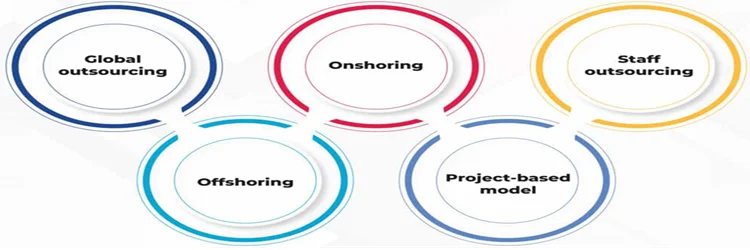Are you familiar with Business Process Outsourcing (BPO)? It functions as a strategic business maneuver, providing companies with a means to optimize their operations. BPO entails entrusting specific business functions to external service providers, allowing organizations to concentrate on their core competencies while benefiting from cost-effectiveness and increased productivity.
This guide serves as a comprehensive exploration of various BPO business models, elucidating the diverse approaches that companies can adopt to enhance their success. Through a pragmatic examination, we aim to highlight the considerable advantages and considerations associated with outsourcing, offering a nuanced understanding of how this strategic approach can catalyze operational excellence.
What is a BPO Model
Understanding BPO Business Models
BPO models are vital for efficient and cost-effective operations, involving outsourcing non-core tasks to specialized providers. This initial step involves a comprehensive assessment of business processes, determining which activities can be delegated to external service providers.
Strategic Collaboration with BPO Companies
Once the functions are identified, companies engage in a meticulous selection process for BPO partners. This step is critical for the success of the BPO business model, requiring alignment between the parent company's goals and the capabilities of the chosen service provider. The partnership should be symbiotic, fostering a collaborative environment.
Seamless Integration into Workflow
With BPO partners on board, the actual execution phase commences. This involves the integration of outsourced processes into the existing workflow. Communication channels and technology play a pivotal role during this step, ensuring a seamless and efficient operational environment. The goal is to make the outsourcing transition as smooth as possible.
Continuous Monitoring and Optimization
Post-implementation, companies shift their focus to continuous monitoring and optimization. Regular assessments are conducted to ensure that the outsourced functions maintain high-quality standards. This iterative approach allows for refinement of the BPO business model, adapting to evolving business requirements and technological advancements.
5 Different Types of BPO Business Models
These five types of BPO business models showcase the industry's adaptability and innovation. From the expansive Global Outsourcing Model harnessing global talent pools to the collaborative Joint Venture Model, each approach offers unique advantages.
The Project-Based Model targets specific tasks, Offshoring seeks cost efficiency through global relocation, and the Captive Model empowers companies to establish dedicated subsidiaries for tailored operations. This diversity underscores BPO's flexibility in optimizing processes, costs, and global collaboration.
1. Global Outsourcing Model:
It involves delegating tasks to external service providers across the globe. This model capitalizes on the expertise and cost-effectiveness of different regions. Companies employing this BPO model benefit from a diverse talent pool, scalability, and potential savings. It's akin to having a global team working seamlessly towards shared business goals, fostering efficiency and adaptability.
2. Joint Venture Model:
It stands out as a collaborative approach. This involves two or more entities forming a strategic alliance to create a separate business entity. By combining resources, skills, and knowledge, companies aim to achieve mutual benefits. This model encourages shared risk and reward, often resulting in innovative solutions and enhanced competitiveness within the BPO industry.
3. Project-Based Model:
It is tailored for specific assignments. Companies opt for this BPO model when they have short-term projects or specialized tasks. It allows flexibility in resource allocation, enabling efficient completion of projects without the need for a long-term commitment. This agile approach suits businesses seeking targeted solutions within the BPO domain.
4. Offshoring Model:
It involves relocating specific business processes to a different geographical location, typically one with lower operational costs. This BPO model optimizes resources, tapping into global talent while maintaining control over strategic aspects. Offshoring has become a cornerstone in BPO companies' strategies, offering a balance between cost-efficiency and maintaining operational control.
5. Captive Model:
It revolves around establishing a subsidiary or dedicated unit to handle specific business processes. Unlike outsourcing to third-party providers, companies adopting the Captive Model retain direct control. This BPO model offers a more customized approach, allowing organizations to align operations with their unique requirements while still benefiting from cost advantages associated with outsourcing.
These diverse BPO business models showcase the adaptability within the industry, allowing companies to choose the approach that best suits their objectives and operational dynamics. As the BPO industry evolves, a nuanced understanding of these models becomes essential for companies aiming to enhance efficiency and competitiveness.
Choose Your BPO Business Model with Rely Services
Selecting the right business model is paramount for sustained success. Rely Services offers a diverse range of BPO models tailored to meet specific business needs. From cost-centric models to outcome-driven approaches, our commitment to flexibility empowers businesses to choose what aligns seamlessly with their objectives. With a keen focus on results and efficiency, our BPO company stands out for its innovative solutions and client-centric approach.
As you navigate the myriad possibilities within BPO models, consider the unique advantages each offers in enhancing operational efficiency and cost-effectiveness. Whether opting for a traditional outsourcing model or embracing the collaborative dynamics of co-sourcing, Rely Services ensures a strategic partnership that propels your business forward. Our dedication to transparency and quality permeates every aspect of our BPO services, fostering a symbiotic relationship that goes beyond mere outsourcing.
Make an informed decision for the future of your business by choosing a business model that not only meets the current demands but also adapts to future challenges. Explore the possibilities with Rely Services, where innovative BPO business models converge with a commitment to excellence.
Contact us today and join the transformative journey that optimizes your operations and propels your business towards unparalleled success

Leave A Reply